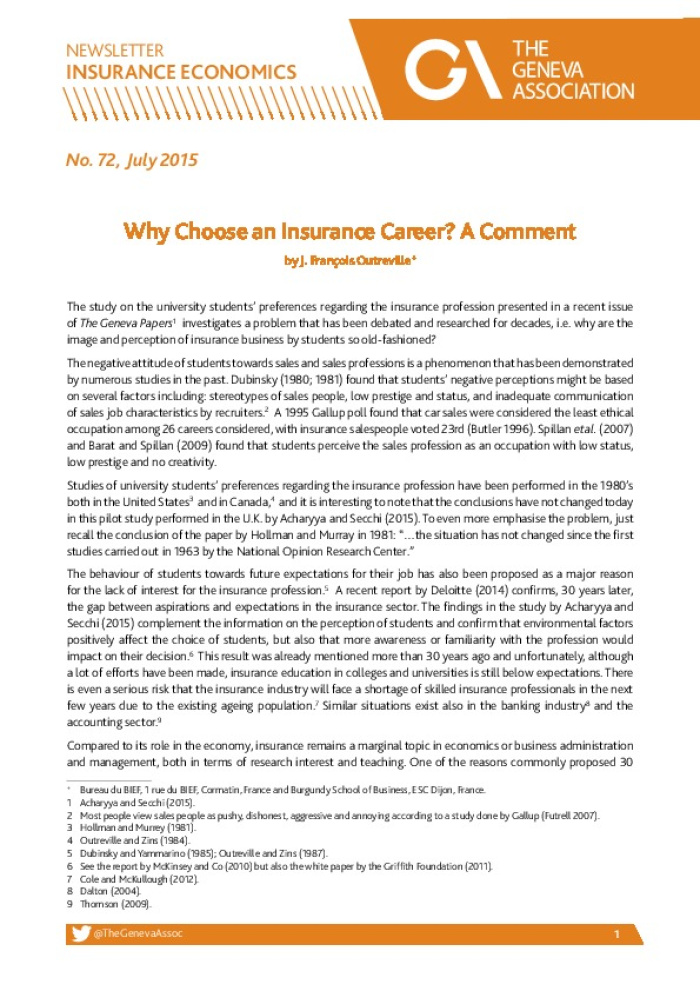Why Choose an Insurance Career? A Comment
Article from Insurance Economics Newsletter No. 72

1 FINANCIAL SBILITY AT ION NEWSLETTER INSURANCE ECONOMICS Why Choose an Insurance Career? A Comment by J. Fran?ois Outreville+ The study on the university students? preferences regarding the insurance profession presented in a recent issue of The Geneva Papers 1 investigates a problem that has been debated and researched for decades, i.e. why are the image and perception of insurance business by students so old-fashioned? The negative attitude of students towards sales and sales professions is a phenomenon that has been demonstrated by numerous studies in the past. Dubinsky (1980; 1981) found that students? negative perceptions might be based on several factors including: stereotypes of sales people, low prestige and status, and inadequate communication of sales job characteristics by recruiters. 2 A 1995 Gallup poll found that car sales were considered the least ethical occupation among 26 careers considered, with insurance salespeople voted 23rd (Butler 1996). Spillan et al. (2007) and Barat and Spillan (2009) found that students perceive the sales profession as an occupation with low status, low prestige and no creativity. Studies of university students? preferences regarding the insurance profession have been performed in the 1980?s both in the United States 3 and in Canada,4 and it is interesting to note that the conclusions have not changed today in this pilot study performed in the U.K. by Acharyya and Secchi (2015). To even more emphasise the problem, just recall the conclusion of the paper by Hollman and Murray in 1981: ??the situation has not changed since the first studies carried out in 1963 by the National Opinion Research Center.? The behaviour of students towards future expectations for their job has also been proposed as a major reason for the lack of interest for the insurance profession. 5 A recent report by Deloitte (2014) confirms, 30 years later, the gap between aspirations and expectations in the insurance sector. The findings in the study by Acharyya and Secchi (2015) complement the information on the perception of students and confirm that environmental factors positively affect the choice of students, but also that more awareness or familiarity with the profession would impact on their decision. 6 This result was already mentioned more than 30 years ago and unfortunately, although a lot of efforts have been made, insurance education in colleges and universities is still below expectations. There is even a serious risk that the insurance industry will face a shortage of skilled insurance professionals in the next few years due to the existing ageing population. 7 Similar situations exist also in the banking industry8 and the accounting sector. 9 Compared to its role in the economy, insurance remains a marginal topic in economics or business administration and management, both in terms of research interest and teaching. One of the reasons commonly proposed 30 + Bureau du BIEF, 1 rue du BIEF, Cormatin, France and Burgundy School of Business, ESC Dijon, France. 1 Acharyya and Secchi (2015). 2 Most people view sales people as pushy, dishonest, aggressive and annoying according to a study done by Gallup (Futrell 2007). 3 Hollman and Murrey (1981). 4 Outreville and Zins (1984). 5 Dubinsky and Yammarino (1985); Outreville and Zins (1987). 6 See the report by McKinsey and Co (2010) but also the white paper by the Griffith Foundation (2011). 7 Cole and McKullough (2012). 8 Dalton (2004). 9 Thomson (2009). No. 72, July 2015 @TheGenevaAssoc INSURANCE ECONOMICS